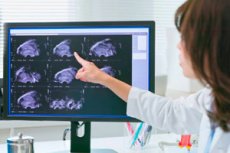New publications
UCSF Study Finds More Than 600 Diseases Linked to Endometriosis
Last reviewed: 03.08.2025

All iLive content is medically reviewed or fact checked to ensure as much factual accuracy as possible.
We have strict sourcing guidelines and only link to reputable media sites, academic research institutions and, whenever possible, medically peer reviewed studies. Note that the numbers in parentheses ([1], [2], etc.) are clickable links to these studies.
If you feel that any of our content is inaccurate, out-of-date, or otherwise questionable, please select it and press Ctrl + Enter.

Records of millions of patients in UC hospitals have shown correlations between endometriosis, one of the most common diseases in women, and a host of other illnesses.
Scientists at UCSF have found that endometriosis, a painful, chronic condition that affects 10 percent of women and often goes undiagnosed, is often associated with conditions such as cancer, Crohn's disease and migraines.
The study could improve the diagnosis of endometriosis and, ultimately, its treatment; it provides the most accurate picture to date of a disease that is as mysterious as it is common.
The study, published July 31 in Cell Reports Medicine, used computational methods developed at UCSF to analyze anonymized medical records collected at six UCSF hospitals.
“We now have the tools and the data to make a difference for the vast number of people suffering from endometriosis. We hope this will be the beginning of a fundamental rethink of how we approach this disease,” said Marina Sirota, PhD, acting director of the UCSF Bakar Computational Health Sciences Institute (BCHSI), professor of pediatrics, and senior author of the paper.
The Power of Big Data UC Health
Endometriosis, often referred to as “endo,” occurs when the endometrium — the blood-rich tissue that lines the uterus before it’s shed during menstruation — spreads to nearby organs. It causes chronic pain and infertility. Endometriosis is estimated to affect nearly 200 million women worldwide.
“Endo is extremely debilitating,” said Linda Giudice, MD, PhD, MSc, a physician-scientist in the UCSF Department of Obstetrics, Gynecology, and Reproductive Sciences and a co-author of the paper. “The impact on patients’ lives is enormous: their personal relationships, their ability to work, have a family, and their mental health.”
The gold standard for diagnosing endometriosis remains surgical intervention with visual detection of endometrial lesions outside the uterus; the main treatment is hormonal therapy to suppress the menstrual cycle or surgical removal of excess tissue.
However, not all patients respond to hormonal therapy, which can have severe side effects. Even after surgery, the disease can recur. Hysterectomy (removal of the uterus) is an extreme measure, usually used in older women, but some patients continue to experience pain after it.
Giudice teamed up with Sirota to use anonymized data from UC Health on patients with endometriosis, which varies widely from patient to patient. Both scientists are project leaders at the UCSF-Stanford ENACT Center for Endometriosis Research.
“The data are messy — they weren’t collected for research, they were collected for a real, human purpose: to help women in need,” Sirota said. “We had a rare chance to comprehensively assess how endometriosis manifests itself in the UCSF population, and then see if those patterns hold up in data from other UC clinics.”
Data connects dots in understanding endometriosis
Using algorithms developed for this task, Umair Khan, a bioinformatics graduate student in Sirota's lab and the paper's first author, looked for connections between endometriosis and the rest of each patient's medical history.
He compared patients with and without endo, and then divided the endometriosis patients into groups based on the similarity of their underlying conditions. Khan compared the patterns he found at UCSF with data from other UC clinics across California.
“We found more than 600 correlations between endometriosis and other conditions,” Khan said. “These included some you might expect, like infertility, autoimmune diseases, and acid reflux, and some you might not, like certain cancers, asthma, and eye disease.”
Some of the patients were found to have migraines, which supports previous research suggesting that migraine drugs may help endometriosis.
“Studies like this were almost impossible before,” added Tomiko Oskotsky, MD, an ENACT investigator, associate professor at UCSF BCHSI, and co-author of the paper. “It was only twelve years ago that anonymized electronic health records became available in such large quantities.”
The study supports the growing understanding of endometriosis as a "multisystem" disorder - a disease that arises from disturbances throughout the body.
“This is the kind of data we need to break the deadlock that has been going on for decades,” Giudice said. “We are finally getting closer to faster diagnosis and, ultimately, we hope, personalized treatment for the millions of women suffering from endometriosis.”
